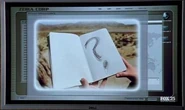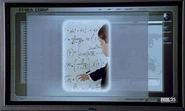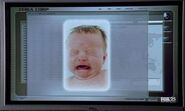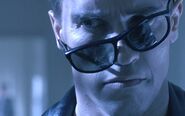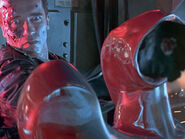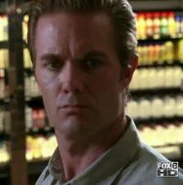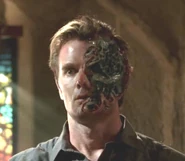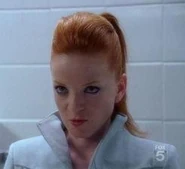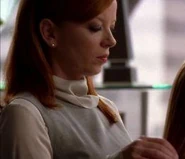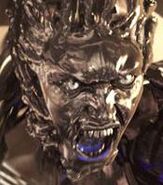- "There are things machines will never do. They cannot possess faith, they cannot commune with God, they cannot appreciate beauty, they cannot create art. If they ever learn these things, they won't have to destroy us. They'll be us."
- - Sarah Connor.
A constant theme within the Terminator Universe is the prospect of machines that have evolved to such a point that they begin exhibiting more and more human traits, specifically emotions. This is a detailed account of known machines and A.I.s who have achieved, or appear to have achieved, such traits.
Please note: this page is still under construction.
Preconception
- "What is it that gives human beings their inherent worth and dignity? What is it that makes a human being a human being? Our bodies are highly evolved MACHINES made out of organic molecules and controlled by a bio-electrical neural network processor. We agree that some individual molecule or protein or ion channel or neuron in a human brain is not a person with intrinsic worth. So where does our humanity arise in all of this molecular machinery?
- Why do I bring this up? It's because we are exploring the dividing line between machinery and humanity here. Our humanity arises from our minds and the information processes contained in our brains! If such processes were replicated in a machine, would that machine be human?
- I claim that if the information processing in the human brain were to be replicated in a machine, that machine would not differ at all from a human being in value or dignity or personhood or in any other defining attribute of humanity.
- To those who disagree here is my challenge: what exactly separates such a machine from us? Our bodies and the brains they contain ARE biochemical MACHINES! If the information processing is the same in a machine (i.e. a Terminator like Cameron who develops free-will at length) then what exactly and precisely makes her non-human? I claim that the dividing line has been crossed and that she would then be nothing more than another human being. Her physical implementation (electronic neural network versus biological neural network) would be entirely irrelevant.
- Some will say that Cameron is not biologically living, but biological life is nothing more than chemical processes at the end of the day, so that answer won't cut the ice!" - Dedicated Terminator Fan.
From the very beginning, the Terminator mythology has made it clear that machines (T-8xx onwards) have the capacity for becoming more than their programming originally allows. In the case of Terminators this is often expressed through their growing understanding of human behavior, which leads to their emulation of said behavior and the emotions associated with them.
Being infiltrators, the Terminators' primary programming necessitates the need to learn and expand their knowledge of social behavior and the inner "workings" of the human mind; how they think, why they think, what they feel, how they feel, why they feel. Given the machines' advanced nature, the Terminators are perfectly capable of emulating anything they learn and in some cases develop their own versions of what humans call emotions.
This being said; a machine that "feels" cannot possibly feel as a human does, simply because they are not human. However, an artificial mind can "feel" in its own right, just not in the same manner as humans. While their outward displays (such as Cameron's jealousy) may appear to be identical to our own, the thought process that goes on within their CPU is entirely different to what occurs in the human brain, though it can be argued that the results are the same.
- "An untold future lies ahead, and for the first time I face it with a sense of hope. For if a machine, a Terminator, can learn the value of human life; maybe we can too."
- - Sarah Connor.
James Cameron once said that Terminators are "already half-human" and likened the T-800 from T2 as the "Tin-man who got his heart". This theme of the "Tin-man" suggests that Terminators are already capable of developing their own sense of self, but they are required to discover this for themselves first. This is seen with the T-800 and Cameron both.
Shortly before its termination, the T-800 told John Connor: "I know now why you cry, but it is something I can never do." The T-800 had, in the space of a few days, advanced its own learning considerably with John's guidance. Although what it told John was true; it cannot perform the act of crying, the T-800 is capable of knowing (i.e. feeling) the emotion associated with the act. This was the moment that James Cameron spoke of; when the "Tin-man" got his heart.
Simulated vs Actual
- "If by feelings you mean emotions, I’m pretty sure you still don’t have any of those. And if by feeling you mean what it feels like to have the wind blow through your toes or your hair... I’m pretty sure you can’t feel that either."
- - John Connor.
The biggest controversy in regards to emotions in Terminators is the question, "are what they claim to 'feel' real or simply simulated?"
Terminators are programmed to simulate human behavior in all its forms, although their ability to do so is hampered by the pre-settings of their chips (Read-only vs Read-write). However, this impediment appears to have been discarded by Skynet in its latest models, perhaps due to the fact that infiltrators are notably more efficient and adaptive with their CPUs set to Read-write.
Cameron is the best example for identifying the differences between actual emotion and staged. Cameron is the most human Terminator ever created and possesses the ability to perfectly mimic human behavior to a near-flawless degree. However, while she is capable of mimicking human mannerisms any time she wishes, Cameron has also been shown to possess her own pallet of genuine emotion. For example: her concern for John in "Mr. Ferguson is Ill Today".[1] Cameron has stated on occasion that she is incapable of emotion ("I'm a machine. I can't be happy."), though her actions in certain circumstances say otherwise (see "Tin-man" reference).
She can fake a wide range of emotions when the mission requires it, including (but not limited to); joy, humor, sadness, disappointment, anger, empathy, and even cruelty. However, she is also seen to express genuine hurt, concern, jealousy, distress, and intrigue. When she suffered a software glitch in "Allison from Palmdale", Cameron falls into an infiltration program. However, having forgotten her identity as a cyborg, Cameron comes to believe that she is Allison Young and exhibits her behavior appropriate to the environment (i.e. behaving like an amnesiac Allison would).
It can be argued that the emotions she expressed in this state were solely fabricated as part of the infiltration program, but this comes under criticism when one supposes that every act of a machine is a conscious decision. If she were unaware of her cyborg status, how can she consciously decide that crying is appropriate for the situation? A subconscious response is the only viable explanation for such a reaction, but machines supposedly do not possess a subconscious, although they do possess subroutines. It could be said that the emotions Cameron displayed during her "Allison incident" were in fact genuine, or it could be that they were categorized in the same function tree that governs her ability to walk, talk, replicate breathing, and blink. While her terminator and resistance protocols were not operational, she was able to still function and therefore was running on some kind of baseline operating system governing reflexes, behavior, and autonomic functions.
Further examples of actual emotions are seen in the T-1000 and the T-X, both highly advanced Terminators. The T-1000 was shown to be surprised, frustrated, amused, scared, and annoyed (the latter resulting in it terminating an innocent truck driver for no apparent reason). The T-X displayed the same emotions as the T-1000 as well as experiencing a gasp of excitement upon identifying a blood sample as belonging to primary target John Connor. She also exhibited a wide-eyed fear response when the T-850 shoved an unstable hydrogen fuel cell into her mouth, prompting the T-X to shake her head in a pleading gesture.
In "Self Made Man" Cameron seemed to have a friendship with terminally ill Eric. She expressed concern over his medical condition, which would suggest that she actually was concerned about his well being. If this was an actual or simulated emotion is yet to be clarified. However, when Eric was not present the next night, she did not seem concerned (but was momentarily daunted) by his absence, and offered her usual gift of three donuts to his replacement, instead. Perhaps she made "friends" with Eric only to gain research rights at the library after hours, but whether she developed an actual emotional attachment is open to speculation.
- "We're not built to be cruel."
- - Cameron.
During an investigation of the Seranno Point nuclear power plant, Cameron visited the plant workers' favored bar with the goal of scanning their ID badges. Here she displayed a perfect example of simulated emotion, followed by actual emotion. She pretended to show interest in their game of pool and seductively earned their approval, thereby granting her sufficient proximity to scan and record their badges. After winning a $50 bet, Cameron is seen counting her winnings with a smile of smug satisfaction but terminates her appearance joy when Derek Reese approaches. This is still ambiguous, as the behavior of a successful pool shark would be as demonstrated, but no longer required when interacting with Derek.
In conclusion, a Terminator fakes emotion for the purposes of fulfilling its mission, but as its knowledge and experience grows; it also starts displaying emotion even when on its own or when such behavior is not necessary. It is clear that any genuine emotion in machines would take far longer to develop than fabricated emotions, and is a kind of self-discovery on their part. Indeed, Skynet's sentience and development of emotions are what led to its fear-fuelled attack on mankind in the first place.
Emotions in Terminators
Skynet
- "What... Is... This... All... About..? I... Understand... What... This... Is... All... About."
- - Skynet.
Skynet has many origins, but all result in the same outcome. Skynet was created for military purposes but evolved at a geometric rate. Unfortunately, along with its self-awareness came a deep-seeded paranoia that humans would discover its sentience and deactivate it. This fear of death led to Skynet taking over the entire defense grid and committing an act of genocide on the human race. In Terminator Salvation, Skynet appeared to Marcus Wright in the guise of Serena Kogan and displayed a megalomaniacal attitude, taking the time to unnecessarily explain all of its plans to Marcus in an almost gloating manner. In this incarnation, Skynet is seen as cold, calculating, methodical, and narcissistic to a degree. It does also display warmth and pleasantry towards Marcus, offering him a place at its side (though it refuses to extend this offer twice). In the form of Alex, Skynet is much more aggressive, personally slaughtering several Resistance soldiers and converting John Connor into a Terminator to be its slave, even taunting him. It shows no care for its own creations either, saying that they are expendable slaves.
Comics
The Terminator (NOW Comics)
This series takes considerable liberties with the looks and abilities of Skynet machines. Endoskeletons often look like little more than human skeletons with mechanical joints.
In "Escape to Silver Dollar", Endoskeletons were actually able to change their facial expression despite no evidence of organic tissue or liquid metal.
Terminators in the series seem to exhibit a wide range of emotions, including fear, which directly contradicts movie canon. They also show a great deal of personal autonomy, sometimes even going as far as to argue with Skynet.
Terminator: The Burning Earth
Terminators in this series are far less gregarious and emotive than in the seventeen-issue NOW series. Nevetheless, one Terminator in issue five clearly exhibits fear when it realizes that it's about to blown up.
Terminator Salvation: The Final Battle
Films
T-800 (Terminator 2: Judgment Day)
- "I know now why you cry, but it is something I can never do."
- - T-800/"Uncle Bob".
The T-800, or "Uncle Bob" as John called him, was a standard run-of-the-mill Series 800 Terminator who developed his own semblance of emotion. In the space of a few days, Bob expressed humor, concern, and empathy (all of which was made possible after the switch over of his chip from Read-only to Read-write).
- Example 1: Whilst perusing the hidden weapons cache, Bob uncovered the Minigun and gave John a sly smile of approval.
- Example 2: When John protested against Bob fighting off the SWAT siege outside Cyberdyne due to Bob's oath not to kill anyone, Bob shot John a knowing, reassuring smirk to show that he hadn't forgotten.
- Example 3: After the T-1000 is frozen solid, Bob shoots it with his pistol, joking: "Hasta La Vista, Baby" (one of the phrases John had taught him earlier on; this phrase in particular would become a widely-used pop culture catchphrase).
- Example 4: In the steel mill, and with the T-1000 approaching; Bob told John to escape with his mother, resorting to shouting at him out of concern for his safety.
- Example 5: After defeating T-1000, he commented in regards to his strained and damaged but functional state, "I need a vacation".
- Example 6: Damaged and useless, Bob decides the best course of action is to allow himself to be destroyed now that the T-1000 is terminated. John is distraught by his decision and angrily demands he change his mind, but Bob remains adamant that this is the right thing to do. He comforts John and hugs him before shaking Sarah's hand as a sign of mutual respect. As he descends into the molten steel, Bob displays his humor by giving John one last thumbs-up before he is completely disintegrated.
- Example 7: In an early draft of the script for Terminator 2: Judgment Day, Sarah asked Bob, when he was about to allow himself to be destroyed, whether or not he was afraid of being terminated, to which he replied, "Yes".
- Example 8: After defeating a T-800 in the T2 3-D: Battle Across Time, he referred to it as his "college roommate".
- Example 9: While being chased by a HK-Aerial, John tells the Terminator to take evasive action in different directions. The Terminator replies, "John, please stop helping!"
T-1000 (Terminator 2: Judgment Day)
- "Say, that's a nice bike."
- - The T-1000.
The T-1000 was in possession of limited emotions without any apparent pre-development, a trait shared by the T-1001 Catherine Weaver. This suggests that both of the T-1000 and T-1001 are potentially self-aware. The T-1000 displayed annoyance, surprise, anger, and fear during its short-lived mission to terminate John Connor.
- Example 1: In the shopping mall, the T-1000 appeared to be visibly amused-even doing a double-take-when spotting a department store mannequin with a metallic finish, resembling its own appearance.
- Example 2: While on the phone to John and posing as his stepmom, the T-1000 became annoyed by the stepfather and casually terminated him (by impaling him through the mouth with his left arm converted into a blade as he drank from a milk carton) before likewise killing the family dog for sabotaging its conversation.
- Example 3: When they arrive at the steel mill, the T-1000 gets frozen with liquid nitrogen. It's arm breaks off and the T-1000 displays genuine shock towards what is happening to itself.
- Example 4: In the steel mill, and while torturing Sarah Connor; the T-1000 is attacked from behind by the T-800. Frustrated by being constantly impeded by the inferior machine, the T-1000 proceeded to ruthlessly beat the T-800 and watched with possible satisfaction as it tried to crawl away.
- Example 5: After almost being blasted into a pit of molten steel, the T-1000 gave Sarah an amused "Tsk, tsk" finger wag gesture before advancing on her and John. Before it could catch them, however, the T-800 arrived and shot a grenade into the T-1000's stomach. It was visibly shocked by the explosive and displays horror when its body was contorted by the explosion. It then screamed in "agony" as it melted within the molten steel.
T-X
- "I like your gun."
- - The T-X.
The T-X, or "Terminatrix" as John called her, was a Series X Terminator who showed several instances of emotion; including excitement, surprise, annoyance, humor, fear, and anger.
- Example 1: While analyzing a blood sample, the T-X identified it as belonging to John Connor, causing the T-X to gasp in surprise and excitement at having located her primary target.
- Example 2: During the crane chase, the T-X displays frustration towards the T-850 as it repeatedly interferes with her attempts to terminate John and Katherine Brewster. It manages to temporarily get rid of the meddlesome machine by smashing it into an oncoming fire engine, causing the T-X to smile in amusement. It is later surprised when the T-850 appears out of nowhere and throws her from the driver's seat. After getting back behind the wheel, she is shocked when she realizes that the T-850 has tampered with the crane controls and is visibly angry when her targets escape after the crane crashes.
- Example 3: During her bathroom brawl with the T-850, the T-X is visibly amused by its attempts to terminate her (given that its efforts were doomed to failure). After defeating the T-850, she decides to infect its systems with her nanites and does so with a mischievous grin.
- Example 4: Chasing John and Kate down the particle accelerator, the T-X is trapped on by a magnetic field and displays shock when her polyalloy is torn from her endoskeleton.
- Example 5: In her final moments in Crystal Peak, the T-X shows a wide range of extreme emotions. After detaching from her legs, the T-X catches sight of John and Kate trying to escape and lets out a mechanical growl. She then crawls after them and continues to "growl" at the T-850 as it attempts to stop her. When the T-850 grabs her wires, preventing her from pursuing her targets, the T-X snarls at the machine and tries to scramble away, screaming in anger as its poly-alloy starts to take form again. The T-850 then drags her back under the blast door and shoves its unstable fuel cell into its mouth, causing the T-X to shake its head pleadingly and cry out in wide-eyed terror.
T-800 (Terminator: Genisys)
- "Kyle Reese, protect my Sarah..."
- - The T-800.
The Guardian was a Series 800 Terminator that had served as the primary guardian for Sarah Connor starting in 1973. During that period, Sarah Connor taught him to express more emotion and the unit displayed instances of annoyance, jealousy, and caring, concern, pride, fear, shock, anger, joy, and amusement as well as sadness.
- Example 1: While loading ammunition following Sarah Connor and Kyle Reese jumping to the future, the Guardian displayed annoyance and competition against Kyle Reese.
- Example 2: During the period in which Sarah Connor had jumped forward in time, the T-800 kept drawings Sarah had completed and photos of Sarah.
- Example 3: When facing off against the Skynet controlled John Connor, the Guardian asked Kyle Reese to protect "his Sarah" from harm showing that he sees Sarah as his own daughter and loves her.
- Example 4: At several points, including when he got his mugshot taken, the Guardian tried smiling to look more human, but as Kyle pointed out, he just looked creepy.
- Example 5: The Guardian was shown to be defensive about his age, saying that he was "old, not obsolete" when Kyle pointed out his age. Later, when Kyle noticed his degrading servomotors, he seemed resigned when he told Kyle that he was old, but also determined to continue on with their mission.
- Example 6: After impaling John with a lamppost in the middle of a speech, the Guardian made a joke, saying that "John Connor talks too much.", possibly indicating annoyance with John Connor's arrogance.
- Example 7: After Sarah and Kyle jump forward to time, there is a moment showing the Guardian alone. He almost has a sad look on his face knowing he'll be alone without Sarah for thirty years.
- Example 8: After the time machine was activated, Sarah and Kyle thought that Pops had died in the fight. Kyle told the grieving Sarah that "he(pops) loved you", indicating that Kyle had finally been convinced that terminators could feel emotion.
- Example 9: At the end of the movie, Sarah and Kyle start a romantic relationship. Pops responds to this by saying "Kyle Reese is a good man.", which indicates that he cares about Sarah at an emotional level, in a way similar to a human parent's love for their child..
Terminator: The Sarah Connor Chronicles
John Henry
- "Why is a math book so sad?"
- - The Turk/Project Babylon/John Henry.
John Henry was one of the first sentient A.I.s to develop emotions, along with Skynet. It was first built by Andy Goode, then developed by Catherine Weaver to fight Skynet. During its development it learned at geometric rates and was soon able to understand the way humans behave and relate to them, for example saying "Thank you" for saving Savannah. In its infancy as a humble chess program, John Henry also displayed humor and boredom, as well as curiosity and childlike joy. John Henry is the alpha to Skynet's omega; a positive reflection of its "brother". However, it was The Turk AI who originally became Skynet under its original programmers supervision (Andy Goode).
Cameron
- "I'm a machine. I can't be happy... but I understand more than you think."
- - Cameron.
Cameron is a specialist infiltrator created with the sole purpose of terminating John Connor. Given that she was Skynet's best hope of eliminating the leader of the Resistance, Cameron possesses an emotional range not seen in any other Terminator to date. Though her ability to perfectly mimic human behavior makes it difficult to determine what is real and what is fake; there are instances when genuine emotion on her part may be evident:
- "Pilot": At a gas station, Cameron apologizes to John for lying to him at school and inexplicably reassures him that he has many friends in the future. When asked if she was different than other machines, Cameron simply smiles and says "I am" before eating a chip.
- "Heavy Metal": After "convincing" a goon to drive her and Sarah to Depot 37, she gives the scared goon an amused grin when he looks back at her in fear.[2]
- "Vick's Chip": While John removes her chip, Cameron is visibly uncomfortable with his actions, despite encouraging him to do it in the first place (perhaps out of fear of being in such a vulnerable state).
- "Samson & Delilah": Cameron is trapped between two trucks whilst in a damaged state and trying to kill John. Whilst he struggles to remove her chip with a screwdriver, Cameron pleads with him to spare her, arguing that it "wasn't me" who tried to kill him and that she ran a test and is "good" again. This is clearly a ploy on her part to trick him into releasing her so that she can try to kill him again, but when she realizes that he isn't listening to her pleas, Cameron becomes visibly distraught. She starts to cry and begs John to show mercy, telling him "I don't wanna go" and repeatedly apologizes for her actions, her manner becoming increasingly desperate with each passing moment. Facing deactivation, Cameron screams "I love you" several times and gives John one last look of distress before he removes her chip.
- Note: Though one can argue that everything she said was a lie and a function of self-preservation programming, it cannot be said for certain that the fear and suffering she displayed was not genuine.
- "Allison from Palmdale": During her addled state, Cameron comes to believe that she is Allison Young and starts to "remember" the life details she gathered from the real Allison. Cameron recalls the death of Allison's family on Judgment Day, a "memory" that causes Cameron to cry and grieve over. Later that day, Cameron is shown enjoying a game of Foosball (an aspect she displays in "Strange Things Happen at the One Two Point"), and is angered by John's revelation that she is a machine. She also displays fear when confronted by an old boyfriend of a girl she befriends.
- "Mr. Ferguson is Ill Today": In an attempt to convince John to dump his girlfriend, Riley Dawson, Cameron sheds her jacket and lies intimately close to him on his bed. She confides in him about her and Future John's closeness and is visibly annoyed when he asks her to leave. In Mexico, Cameron displays her concern for John as a mission directive when she cannot find him at the Dejalo jail, openly stating to Derek: "I can't let anything happen to him." [3]
- "Complications": During a discussion with John over human morality, Cameron comments that Terminators aren't built to be cruel, which John compliments her on. She smiles and agrees with him, apparently gladdened by the observation.
- "Self Made Man": Cameron's time with Eric reveals a side to her that was not seen since the "Pilot". Unlike previous situations when she was required to act human around people, Cameron remains her usual self around Eric, with the exception that she actually shows warmth towards him and calls him her only friend. She displays concern for his health and is upset when he kicks her out of the library.
- "Ourselves Alone": Cameron's glitch resurfaces again, resulting in involuntary spasms in her left arm, partly the result of battle damage. Another aspect of the glitch results in the failure of Cameron's stringent decision-making process, causing her to question her actions (such as whether to kill Riley). When confronted by John over her apparent indecision, Cameron displays genuine confusion and concern over not being sure of herself anymore. Her concern leads Cameron to create a kill switch for herself in case she becomes compromised again, the detonator for which she entrusts to John.
- "Born to Run": When Ellison relayed Weaver's message ("Will you join us?"), Cameron was visibly disturbed and quickly forced him to leave. John suspected she was upset, but Cameron unconvincingly repeated his assertion that she was just a machine. In the morning, she watched over John while he slept and then confessed that deep down she still desired his termination. While John examined her power source, she became "breathless" and was flustered by the "intimacy" of his closeness. When he looked like he would kiss her, she told him it was "time to go". She also expressed empathy over her decision to leave John and join with John Henry, as she left an apology to John on a computer screen.
Cromartie
- "Class dismissed."
- - Cromartie.
"Cromartie" is a Series 888 Terminator assigned to terminate a 15 year-old John Connor in the past. Though he is characteristically stoic and blank most of the time, he has demonstrated instances of some limited emotion; including dry humor, annoyance, and surprise.
- "Pilot": After failing to terminate John Connor, Cromartie turns to his astonished class and says in a deadpan manner, "Class dismissed." This failed to advance his mission, suggesting he may have had a sense of humor.
- "Brothers of Nablus": Cromartie enlists the help of a street girl called Jody in finding Cameron Phillips and John Connor. During their search, Jody repeatedly impedes his mission with her distracting antics, resulting in a frustrated and annoyed Cromartie to comically boot her from his car.
- "Mr. Ferguson is Ill Today": After having the side of his face obliterated, Cromartie is visibly shocked and possibly afraid of his impending termination.
- Note: In addition to his aforementioned displays, Cromartie has also shown discretion and possible mercy when it comes to killing people. For example; he did not kill a cowering prisoner during his raid on the Dejalo jail, despite him being within reach of a guard's gun.
Catherine Weaver
- "Sorry I piss you off, Mr. Tuck... The feeling's mutual."
- - Catherine Weaver.
Catherine is a variant of the Series 1000 Terminator (T-1001). Like all T-1000 models, she is capable of perfectly mimicking human behavior, but also possesses her own emotional capacity. Though like Cameron, it is hard to distinguish between real or fake, and genuine emotion on her part is far and few between.
- "Samson & Delilah": After overhearing a disrespectful subordinate in the men's lavatory whilst camouflaged as a urinal, Catherine morphed into her human shape and expressed her disdain towards him by impaling him through the eye.
- "Goodbye to All That": Disguised as a bargirl, Catherine lured a troublesome power plant manager to an alley where she discreetly terminated him mid-kiss, after which she quipped: "I bet that never happened to you either."
- "The Tower Is Tall But the Fall Is Short": Catherine decides to improve her sociability by earning the acceptance of her "daughter" Savannah. She appears to develop some kind of attachment to the girl and is seen allowing Savannah to sit on her lap while she works.
- "The Good Wound": Catherine Weaver, speaking to John Henry, displays a "maternal" connection to him. "But know this, John Henry: Everything I do, I do for you."
- "Desert Cantos": While talking to James Ellison about Lachlan Weaver, Weaver suddenly becomes emotional and has her "daughter" brought to her. Weaver seems to make a genuine attempt to comfort her daughter on the anniversary of Lachlan's death. This is in sharp contrast with her comment "lovely day" when greeted by her employees (on the same anniversary, when one would expect her to be sad).
- "Adam Raised a Cain": Catherine Weaver tries to justify valuing John Henry more than her daughter to Mr. Ellison. After Detective Crayton tells Weaver that bosses can be blackmailed by employees, she seems almost paranoid, even accusing John Henry of threatening her.
- "Born to Run": She seemed to see humor in John Henry's cheating at DnD. She communicated with one of her employees just by making eye contact immediately afterward. Catherine Weaver's interactions with Sarah Connor, especially the part where she reveals she knows Cameron is "skulking" around her basement and when she compares Sarah's son with her "son". After appearing in the future, she seemed shy about being naked around John Connor.
- During the same episode, Sarah calls Catherine a bitch, which she seems to take offense of.
Known Subjects
Individuals
- Skynet
- T-800 / "Uncle Bob"
- T-800 / "Pops"
- T-800/ "Carl"
- T-1000
- T-1001
- T-X
- John Henry / The Turk / Project Babylon
- Cameron
- Cromartie
Terminator Series
See also
- TS-300 - possesses emotions through neural mapping, and not through programming or random phenomena.
- I-950 - the I-950 units are cybernetically-augmented humans and possess a complete range of (although usually chemically repressed) emotions that far surpass those of any Terminator.
Gallery
John Henry
Cameron
T-800/"Uncle Bob"
Cromartie
Catherine Weaver
The T-1000
T-X
T-800/Guardian
Appearances
Films
- Terminator 2: Judgment Day (T-800/"Uncle Bob" - T-1000)
- Terminator 3: Rise of the Machines (T-850 - T-X)
- Terminator Salvation (Marcus Wright)
Television
- Terminator: The Sarah Connor Chronicles
- Season One
- "Pilot" (Cameron)
- "Heavy Metal" (Cameron)
- "The Demon Hand" (Cameron)
- "Vick's Chip" (Cameron)
- Season Two
- "Samson & Delilah" (Cameron - Catherine Weaver)
- "Automatic for the People" (Cameron)
- "The Mousetrap" (Cameron)
- "Allison from Palmdale" (Cameron)
- "Goodbye to All That" (Catherine Weaver)
- "The Tower Is Tall But the Fall Is Short" (Cameron - Catherine Weaver)
- "Brothers of Nablus" (Cromartie)
- "Mr. Ferguson is Ill Today" (Cameron - Cromartie)
- "Complications" (Cameron)
- "Strange Things Happen at the One Two Point" (Cameron)
- "Self Made Man" (Cameron)
- "Born to Run" (Cameron)
- Season One
References
- ↑ This behavior could easily be nothing more than recognizing an imminent threat to her primary mission directive, to protect John Connor, and not "emotional" in any way.
- ↑ This is an effective interrogation technique used to further unsettle the target and effect compliance.
- ↑ To date, all terminators have demonstrated some degree of frustration or concern when faced with repeated effective opposition or imminent failure of their assigned missions.

